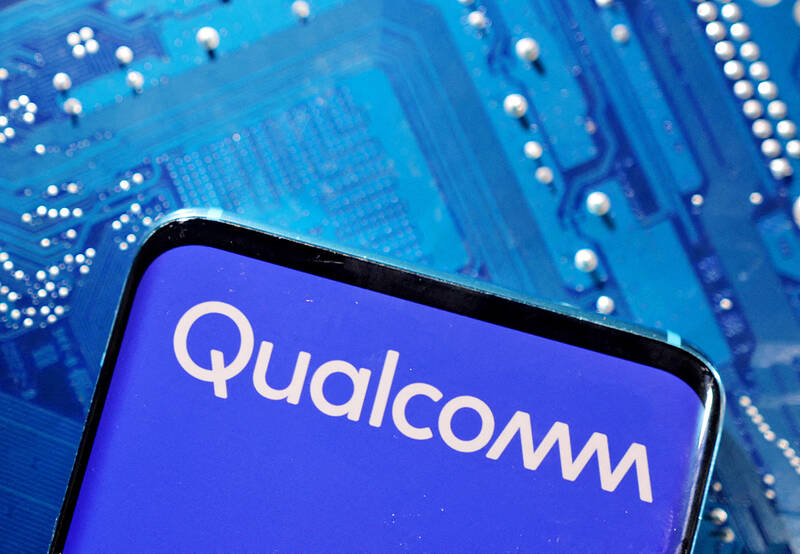Qualcomm Inc has approached Intel Corp to discuss a potential acquisition of the struggling chipmaker, people with knowledge of the matter said, raising the prospect of one of the biggest-ever merger and acquisition deals.
California-based Qualcomm proposed a friendly takeover for Intel in recent days, said the sources, who asked not to be identified discussing confidential information.
The proposal is for all of the chipmaker, although Qualcomm has not ruled out buying some parts of Intel and selling off others.

Photo:REUTERS
It is uncertain whether the initial approach would lead to an agreement and any deal is likely to come under close antitrust scrutiny and take time to complete, the sources said.
Qualcomm has been speaking with US regulators and believes an all-US combination could allay any concerns, they said.
Qualcomm is looking at Intel at a time when its smaller rival is in the midst of the most difficult period in the company’s 56-year history.
Intel’s shares have fallen about 37 percent over the past 12 months, giving it a market value of about US$93 billion.
Qualcomm’s stock has risen more than 50 percent during the same period to a market capitalization of about US$188 billion. At such values, any deal between Qualcomm and all of Intel would rank among the largest on record.
The Wall Street Journal reported Qualcomm’s interest on Friday, driving Intel’s shares up by more than 3 percent. Representatives for Qualcomm and Intel declined to comment.
Intel chief executive officer Pat Gelsinger still believes his turnaround plan could be sufficient for the company to remain independent, but he is open to considering the merits of different potential transactions, the sources said.
Both companies would now assess various options with advisers, they said.
While Qualcomm’s approach raises the prospect of others entering the fray, at least one large rival is opting to sit on the sidelines for now.
Broadcom Inc is not currently evaluating an offer for Intel, the sources said.
The company had previously been assessing whether to pursue a deal, they added.
Advisers continue to pitch ideas to Broadcom, the sources said. A representative for Broadcom declined to comment.
Intel is headed toward its third consecutive year of shrinking sales, estimated to make US$52 billion in revenue this year, just 70 percent of its 2021 revenue.
The stock did receive a bounce last week after the company made a raft of announcements that spurred optimism in Gelsinger’s turnaround plan.
In the most notable move, Intel struck a multibillion-dollar deal with Amazon.com Inc’s Amazon Web Services cloud unit to coinvest in a custom artificial intelligence semiconductor and outlined a plan to turn its ailing manufacturing business, or foundry, into a wholly owned subsidiary.
The decision to separate Intel’s foundry operations from the rest of the tech company is aimed in part at convincing prospective customers — some of which compete with Intel — that they are dealing with an independent supplier.

The US dollar was trading at NT$29.7 at 10am today on the Taipei Foreign Exchange, as the New Taiwan dollar gained NT$1.364 from the previous close last week. The NT dollar continued to rise today, after surging 3.07 percent on Friday. After opening at NT$30.91, the NT dollar gained more than NT$1 in just 15 minutes, briefly passing the NT$30 mark. Before the US Department of the Treasury's semi-annual currency report came out, expectations that the NT dollar would keep rising were already building. The NT dollar on Friday closed at NT$31.064, up by NT$0.953 — a 3.07 percent single-day gain. Today,

‘SHORT TERM’: The local currency would likely remain strong in the near term, driven by anticipated US trade pressure, capital inflows and expectations of a US Fed rate cut The US dollar is expected to fall below NT$30 in the near term, as traders anticipate increased pressure from Washington for Taiwan to allow the New Taiwan dollar to appreciate, Cathay United Bank (國泰世華銀行) chief economist Lin Chi-chao (林啟超) said. Following a sharp drop in the greenback against the NT dollar on Friday, Lin told the Central News Agency that the local currency is likely to remain strong in the short term, driven in part by market psychology surrounding anticipated US policy pressure. On Friday, the US dollar fell NT$0.953, or 3.07 percent, closing at NT$31.064 — its lowest level since Jan.

The New Taiwan dollar and Taiwanese stocks surged on signs that trade tensions between the world’s top two economies might start easing and as US tech earnings boosted the outlook of the nation’s semiconductor exports. The NT dollar strengthened as much as 3.8 percent versus the US dollar to 30.815, the biggest intraday gain since January 2011, closing at NT$31.064. The benchmark TAIEX jumped 2.73 percent to outperform the region’s equity gauges. Outlook for global trade improved after China said it is assessing possible trade talks with the US, providing a boost for the nation’s currency and shares. As the NT dollar

The Financial Supervisory Commission (FSC) yesterday met with some of the nation’s largest insurance companies as a skyrocketing New Taiwan dollar piles pressure on their hundreds of billions of dollars in US bond investments. The commission has asked some life insurance firms, among the biggest Asian holders of US debt, to discuss how the rapidly strengthening NT dollar has impacted their operations, people familiar with the matter said. The meeting took place as the NT dollar jumped as much as 5 percent yesterday, its biggest intraday gain in more than three decades. The local currency surged as exporters rushed to